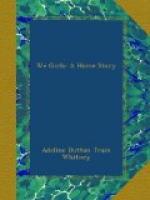And then came the chestnut-roasting, before the bright red coals. Each girl put down a pair; and I dare say most of them put down some little secret, girlish thought with it. The ripest nuts burned steadiest and surest, of course; but how could we tell these until we tried? Some little crack, or unseen worm-hole, would keep one still, while its companion would pop off, away from it; some would take flight together, and land in like manner, without ever parting company; these were to go some long way off; some never moved from where they began, but burned up, stupidly and peaceably, side by side. Some snapped into the fire. Some went off into corners. Some glowed beautiful, and some burned black, and some got covered up with ashes.
Barbara’s pair were ominously still for a time, when all at once the larger gave a sort of unwilling lurch, without popping, and rolled off a little way, right in toward the blaze.
“Gone to a warmer climate,” whispered Leslie, like a tease. And then crack! the warmer climate, or something else, sent him back again, with a real bound, just as Barbara’s gave a gentle little snap, and they both dropped quietly down against the fender together.
“What made that jump back, I wonder?” said Pen Pennington.
“O, it wasn’t more than half cracked when it went away,” said Stephen, looking on.
Who would be bold enough to try the looking-glass? To go out alone with it into the dark field, walking backward, saying the rhyme to the stars which if there had been a moon ought by right to have been said to her:—
“Round and round, O stars so fair!
Ye travel, and search out everywhere.
I pray you, sweet stars, now show to me,
This night, who my future husband shall be!”
Somehow, we put it upon Leslie. She was the oldest; we made that the reason.
“I wouldn’t do it for anything!” said Sarah Hobart. “I heard of a girl who tried it once, and saw a shroud!”
But Leslie was full of fun that evening, and ready to do anything. She took the little mirror that Ruth brought her from up stairs, put on a shawl, and we all went to the front door with her, to see her off.
“Round the piazza, and down the bank,” said Barbara, “and backward all the way.”
So Leslie backed out at the door, and we shut it upon her. The instant after, we heard a great laugh. Off the piazza, she had stepped backward, directly against two gentlemen coming in.
Doctor Ingleside was one, coming to get his supper; the other was a friend of his, just arrived in Z——. “Doctor John Hautayne,” he said, introducing him by his full name.
We knew why. He was proud of it. Doctor John Hautayne was the army surgeon who had been with him in the Wilderness, and had ridden a stray horse across a battle-field, in his shirt-sleeves, right in front of a Rebel battery, to get to some wounded on the other side. And the Rebel gunners, holding their halyards, stood still and shouted.




